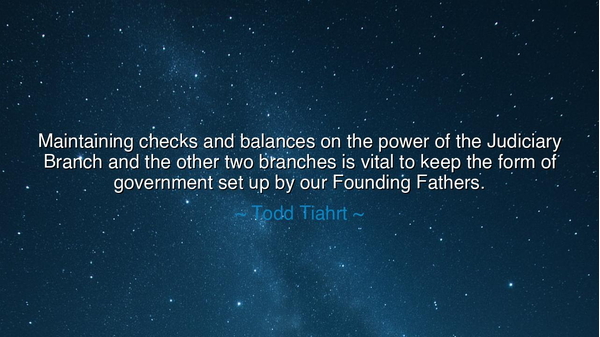
Maintaining checks and balances on the power of the Judiciary
Maintaining checks and balances on the power of the Judiciary Branch and the other two branches is vital to keep the form of government set up by our Founding Fathers.






The words of Todd Tiahrt resound with the solemn wisdom of those who remember the fragile origins of liberty: “Maintaining checks and balances on the power of the Judiciary Branch and the other two branches is vital to keep the form of government set up by our Founding Fathers.” In this declaration lies the heartbeat of the American Republic—the sacred idea that power must never go unrestrained, that authority, left to itself, bends always toward corruption. Tiahrt’s words are not merely about law; they are about the eternal struggle between freedom and tyranny, between the pride of rulers and the vigilance of the governed.
To understand the origin of this truth, we must look back to the birth of the United States, when the Founding Fathers, in their wisdom, forged a new form of government out of the ashes of monarchy. They knew the perils of unchecked power. They had seen kings who claimed divine right, judges who bowed to crowns, and legislatures that served not the people, but themselves. Out of this crucible of oppression, they conceived a system not of rulers and subjects, but of balanced powers—a government of three branches, each bound by law and each able to restrain the others. The Legislative, Executive, and Judicial powers were not to be rivals for dominance, but guardians of equilibrium, each standing watch so that none might rise as a tyrant over the rest.
Tiahrt’s words echo that founding principle. He reminds us that even the Judiciary, which interprets the law, must not be above the law. Though judges do not wield the sword or the purse, they hold the pen that defines justice, and with that pen, they may either preserve liberty or erode it. The ancients understood this as well. In Plato’s Republic, Socrates warned that when those who interpret justice forget humility, they become tyrants cloaked in virtue. The rule of law—that no man, not even a judge, stands above the Constitution—is the cornerstone upon which all liberty rests. Without it, the very architecture of democracy begins to crumble.
Consider a moment in history when this balance was nearly lost. In the 1930s, during the Great Depression, President Franklin D. Roosevelt, frustrated by Supreme Court decisions that struck down parts of his New Deal, sought to increase the number of justices—a move many saw as an attempt to tilt the Court in his favor. Though Roosevelt’s intentions were born of urgency, the act was met with fierce resistance. The people saw that even good intentions can threaten freedom if they unsettle the delicate harmony between branches. The plan failed, and the lesson endured: that power, once unbalanced, endangers all—for the structure of liberty is as delicate as it is strong, and must be guarded against even the noblest temptation to expand authority.
Yet the balance of powers does not defend itself. It relies upon the virtue and vigilance of the people. As the Founders often said, the Constitution is but parchment unless it lives in the hearts of citizens. “A republic, if you can keep it,” said Benjamin Franklin, and those words are the eternal companion to Tiahrt’s warning. The machinery of checks and balances is not self-sustaining—it demands courage from legislators who will question the executive, restraint from judges who will not overreach, and integrity from presidents who will obey the limits of their office. And it demands an informed people who understand that liberty requires participation, not mere comfort.
The ancients would call this civic virtue, the harmony between power and morality. For law without virtue becomes tyranny, and virtue without law becomes chaos. The Founding Fathers knew that men are not angels; they therefore built a government that assumes imperfection and guards against it. Tiahrt’s reminder is thus both a call to wisdom and a cry for humility. When one branch grows too mighty—when courts dictate policy, or executives rule by decree, or legislatures abandon duty—the republic trembles. But when each honors its boundary, the nation stands unshaken, as a temple built upon the pillars of order and justice.
So, my children of the future, take this teaching to heart: freedom is not the absence of power, but the balance of it. The checks and balances that sustain the republic are not relics—they are living safeguards, renewed with every act of integrity and endangered with every act of neglect. Do not scorn them as mere politics; they are the bones of liberty itself. Guard them with your voice, your vote, and your conscience. Question those who seek to rule without restraint, and honor those who serve with humility. For when the branches of government remain balanced, the tree of freedom endures; but when one grows too proud and overshadows the others, the roots of liberty begin to die.
Thus, let the words of Todd Tiahrt stand as a warning and a guide: the Founding Fathers gave us a system of balance not to make government slow, but to make it safe; not to prevent progress, but to protect principle. In honoring that design, we preserve not only the structure of a nation, but the spirit of justice itself. For when power is balanced, truth is free—and a free people, governed by law and virtue, may endure for generations beyond the memory of their founders.






AAdministratorAdministrator
Welcome, honored guests. Please leave a comment, we will respond soon